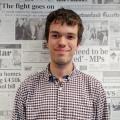
THE director of the Lakes International Comic Arts Festival has defended the work chosen for its Palestine exhibition and said it 'does not feature anti-semitic imagery.'
This comes amid national news publications UnHerd and The Telegraph reporting on a debate around the festival's decision to host Palestinian artist Mohammad Saba'aneh with the exhibition he is part of receiving £15,000 of British Council funding to feature 12 comic artists from the region.
The Telegraph article said his drawings 'appear to show a Jewish locust predating on Jerusalem' and 'an octopus with what appears to be an Israeli flag on its helmet.'
Julie Tait, director of the comic arts festival, said: "We are fully aware of Mohammad Saba'aneh’s past work, and our decision to include him in the festival was made after careful consideration."
READ MORE: Barrow to Manchester drug group jailed for total of 50 years
Ms Tait said that the festival, which takes place in Bowness this weekend, does not 'platform' any of its guests but showcases 'elements of their work.'
She said in Mr Saba'aneh's case this was a graphic novel he produced after being imprisoned by the Israeli Government, which will be part of the exhibition Enter the Mulberry Tree and Fly Free: Palestinian Comics Revealed.
She added that Mr Saba'aneh was an 'internationally renowned artist' and his inclusion is part of a wider programme of events celebrating comic art from around the world.
Ms Tait said that Mr Saba'aneh is due to appear in an event about freedom of expression alongside another artist originally from Russia.
"There people can freely ask questions in a mutually-respectful environment including about his past work," she said.
A spokesperson from The British Council said it is the UK's international organisation for cultural relations. It added that it supports 'peace and prosperity' between the UK and other countries through arts and culture, education and English language teaching.
“We are aware of concerns that have been raised regarding a selection of political cartoons previously produced by one of the curators. These cartoons do not form part of the exhibition at LICAF, which aims to highlight the unique creativity of Palestinian comic art," the spokesperson added.
In 2015, Mr Saba'aneh told The Washington Post that his images are aimed at 'radical Jewish settlers' in the West Bank on land Palestinians want for a state, not just 'any Jew.'



Comments: Our rules
We want our comments to be a lively and valuable part of our community - a place where readers can debate and engage with the most important local issues. The ability to comment on our stories is a privilege, not a right, however, and that privilege may be withdrawn if it is abused or misused.
Please report any comments that break our rules.
Read the rules hereLast Updated:
Report this comment Cancel